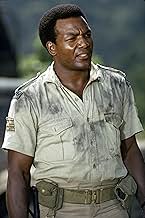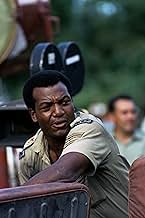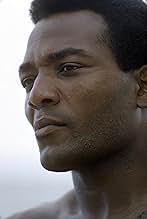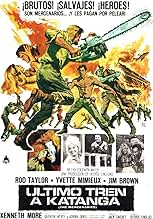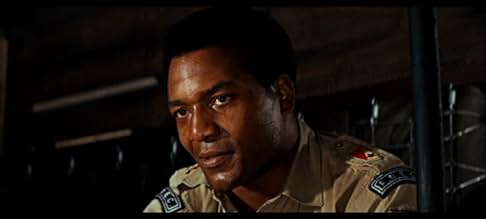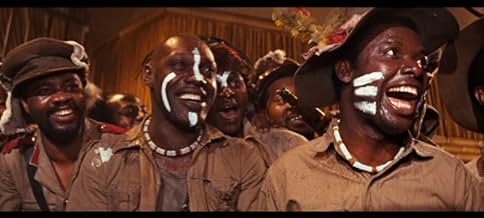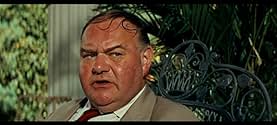IMDb RATING
6.8/10
3.8K
YOUR RATING
A band of mercenaries led by Captain Curry travel through war-torn Congo across deadly terrain, battling rival armies, to steal $50 million in uncut diamonds. But infighting, sadistic rebels... Read allA band of mercenaries led by Captain Curry travel through war-torn Congo across deadly terrain, battling rival armies, to steal $50 million in uncut diamonds. But infighting, sadistic rebels and a time lock jeopardize everything.A band of mercenaries led by Captain Curry travel through war-torn Congo across deadly terrain, battling rival armies, to steal $50 million in uncut diamonds. But infighting, sadistic rebels and a time lock jeopardize everything.
- Director
- Writers
- Stars
- Awards
- 1 nomination total
Alex Gradussov
- Belgian Refugee
- (uncredited)
Paul Jantzen
- Capt. Hansen
- (uncredited)
David Lomas
- Pilot
- (voice)
- (uncredited)
- Director
- Writers
- All cast & crew
- Production, box office & more at IMDbPro
Featured reviews
A nasty and terrific gem of an action movie, the best of Rod Taylor's career. Very exciting, expertly acted, and with a beautiful score that sounds like it was done by Maurice Jarre (it wasn't). Highly recommended.
This is an excellent film and definitely one of Rod Taylor's best performances. Taylor is Curry, a mercenary commander in the Congo, during the Katanga secession. Jim Brown is his friend and number two, a US educated Congolese. Taylor plays Curry as a true mercenary of the period: ruthless, greedy, loyal to his comrades, and distrustful of his rivals and employers.
The film mixes two different periods of the civil wars in the Congo; the Katanga secession in 1960 and the Simba revolt in 1964. The original book is set squarely during the Katanga period and involves the Baluba war, not the Simba's. However both periods were exemplified by brutality on all sides. The film accurately portrays the enmity between the Katanga forces and the UN troops sent to intervene. It also accurately depicts the Belgian interests in Katanga.
Much like the train the mercenaries ride, the film starts out slow and builds up steam along the route. By the end, it's a runaway that comes crashing to its end. This is war and humanity at its worst, make no mistake. The closest I can come to finding a "good guy" is Jim Brown, the soldier who wants his country to be free and have its place in the modern world.
The Nazi character was based on an actual German mercenary in the Congo, Siegfried Mueller. Mueller was noted for wearing the Iron Cross, which he earned in the Second World War, on his uniform. The film makers changed it to a swastika for greater effect (I presume). There is a slight problem with the continuity of this character, as part way through the film, his voice is obviously dubbed by another actor. Presumably, this was due to sound problems and the unavailability of the actor to loop his lines (It sounds like Paul Frees).
All-in-all this is a great film; vastly superior to others of the genre, such as The Wild Geese and The Dogs of War. Just remember, war more often brings out the worst in humanity, rather than the best.
The film mixes two different periods of the civil wars in the Congo; the Katanga secession in 1960 and the Simba revolt in 1964. The original book is set squarely during the Katanga period and involves the Baluba war, not the Simba's. However both periods were exemplified by brutality on all sides. The film accurately portrays the enmity between the Katanga forces and the UN troops sent to intervene. It also accurately depicts the Belgian interests in Katanga.
Much like the train the mercenaries ride, the film starts out slow and builds up steam along the route. By the end, it's a runaway that comes crashing to its end. This is war and humanity at its worst, make no mistake. The closest I can come to finding a "good guy" is Jim Brown, the soldier who wants his country to be free and have its place in the modern world.
The Nazi character was based on an actual German mercenary in the Congo, Siegfried Mueller. Mueller was noted for wearing the Iron Cross, which he earned in the Second World War, on his uniform. The film makers changed it to a swastika for greater effect (I presume). There is a slight problem with the continuity of this character, as part way through the film, his voice is obviously dubbed by another actor. Presumably, this was due to sound problems and the unavailability of the actor to loop his lines (It sounds like Paul Frees).
All-in-all this is a great film; vastly superior to others of the genre, such as The Wild Geese and The Dogs of War. Just remember, war more often brings out the worst in humanity, rather than the best.
...about mercenary Curry (Rod Taylor) and his partner Ruffo (Jim Brown). They are both in 1960's The Congo, ready to carry out a mission for Congolese dictator Ubi (Calvin Lockhart). Curry is to get troops together and rescue the residents of Port Reprieve, along with 50 million in diamonds. In the troop he gathers together are an alcoholic doctor (Kenneth More) and a Nazi ex-officer (Peter Carsten). All set out on a makeshift train. On the way, they meet refugee Claire (Yviette Mimieux), whose husband has just been murdered. Complications ensue.
This action film gives little chance for characterization. Taylor is fine, especially before movie takes the turn toward action thriller. You can read his eyes to see what his character is thinking, and he has a way with a sarcastic line. Brown is also good. Mimieux never gets a chance to develop her character; she's basically the sex interest or walking plot device.
For 1968, film is remarkably violent. Don't get too fond of the characters. If you want to look for themes, the film has an interesting one spelled out. Listen to the tales of superstitions, and a character's behavior near the film's end. This is a good action film that gives food for thought and is worth a watch.
This action film gives little chance for characterization. Taylor is fine, especially before movie takes the turn toward action thriller. You can read his eyes to see what his character is thinking, and he has a way with a sarcastic line. Brown is also good. Mimieux never gets a chance to develop her character; she's basically the sex interest or walking plot device.
For 1968, film is remarkably violent. Don't get too fond of the characters. If you want to look for themes, the film has an interesting one spelled out. Listen to the tales of superstitions, and a character's behavior near the film's end. This is a good action film that gives food for thought and is worth a watch.
First half is solid if at times too brutal action/adventure (i.e. didn't much care for the execution of two kids by the cartoon Nazi) with paradoxically lovely location shooting in Jamaica, standing in for The Congo. Unfortunately, in the second half, director Jack Cardiff yields control to Ranald McDougal and Adrian Spies' too talky screenplay and the action has to find its way around dull scenes of soul searching and philosophizing over the Big Question of "What is the basic immmorality of a mercenary?" Sound a bit pretentious? Yeah, I thought so, too. As for the acting it's hit and miss. Rod Taylor is much better in the first half with his sardonic Aussie bit than he is in the second half with his blood streaked, breast beating bit. As for Jim Brown he is, as usual, wooden throughout. Peter Carstens does as well as can be expected with the stereotyped "Ve vill make you talk" storm trooper role and Yvette Mimieux is ok eye candy. Best performance is Kenneth More as the drunken doc (another cliche, but More embraces it well) . Give this one a C plus.
This film, which I came to know as "Dark of the Sun" (the better title, as most believe), is one of those compulsively re-watchable pictures year after year. I saw it as a kid but it was later, when I was around 30, when I caught it on a PBS TV station, that I was stunned to realize it is one of my favorite films of all time. I nearly became obsessed with it, recording it for repeat viewing (sometimes 2 days in a row), later buying a quality VHS version, and finally obtaining a widescreen version, a goal of the last half-dozen years. From the first frame, during the credits, when you hear the perfect jazz-influenced score by Jacques Loussier, to the haunting ending, this film draws you in and doesn't let go, inviting you back again & again. I say 'you' but of course I'm speaking of myself; I can't really explain the hold it has on me and what director Cardiff put together that connected so strongly with me. Many familiar with this film call it Rod Taylor's best work and I agree there. He epitomizes the man's man here, tougher, by necessity, than all the other tough guys around him; able to outfight anyone mano-a-mano; and, at the same time, able to command - demanding and keeping the loyalty of his men. Besides the obvious violence & gun-play, throughout are hints and mention of the savagery, the brutality of war, but nothing can or should faze him - until, that is, he loses his best friend. This is something, the one thing, he was unprepared for. And he loses it, he loses all his control, his command of himself and others. It's a fantastic ending. And, like many other scenes, complemented by that fabulous score, it calls me back over & over. Once again, I see that train car break off; again I see it slowly roll back to the waiting bloodthirsty Simbas, all the passengers doomed. I know what will happen, but it demands my attention again, as if in a recurring nightmare. I suppose this may be a great thing about films - sure, they may not ever make them like this again, but you always have these past adventures to savor as many times as you wish. And the films will always give you that same or similar emotional satisfaction you crave.
Did you know
- TriviaJim Brown scheduled an interview in 1968 with critic Roger Ebert to promote this movie but canceled it at the last minute. He apologized later and told Ebert he couldn't do it because he just didn't like the movie. He said, "It's the only film I've done I really didn't like. If I'd come here to Chicago and some guy had said, I don't like your flick at all, how could I disagree with him? If you put yourself on the line, you have to be able to believe what you say. But if you KNOW the movie's no good, man, and you have to say it is, that eats you up. When I read the script, I thought it was going to be a political movie, and I thought we might even have a hassle. But the director simplified it to brutality and bad taste."
- GoofsThere are already cut diamonds in the stash. They don't mine cut diamonds in Congo - or anywhere else for that matter.
- ConnectionsFeatured in Lionpower from MGM (1967)
- How long is Dark of the Sun?Powered by Alexa
Details
- Release date
- Countries of origin
- Official site
- Languages
- Also known as
- Dark of the Sun
- Filming locations
- Jamaica(Exterior)
- Production company
- See more company credits at IMDbPro
- Runtime
- 1h 40m(100 min)
- Sound mix
- Aspect ratio
- 2.35 : 1
Contribute to this page
Suggest an edit or add missing content

![Watch Trailer [EN]](https://m.media-amazon.com/images/M/MV5BMDQxYTY1MjQtOGJiOC00OWZlLWFkZWItOGY3YTczYTU0YzNmXkEyXkFqcGdeQXRyYW5zY29kZS13b3JrZmxvdw@@._V1_QL75_UX500_CR0)
